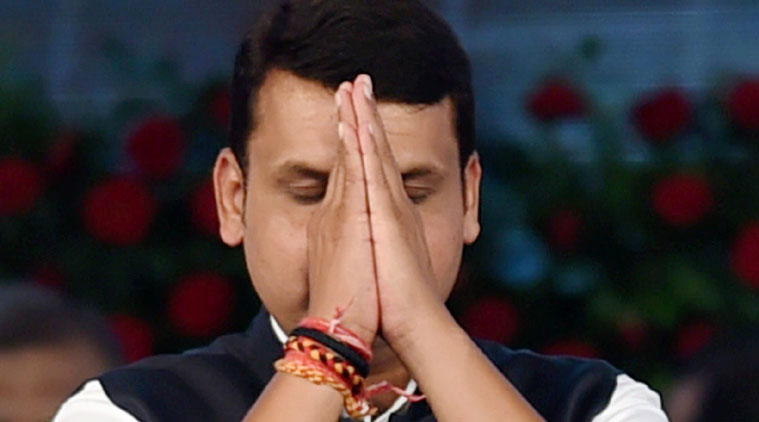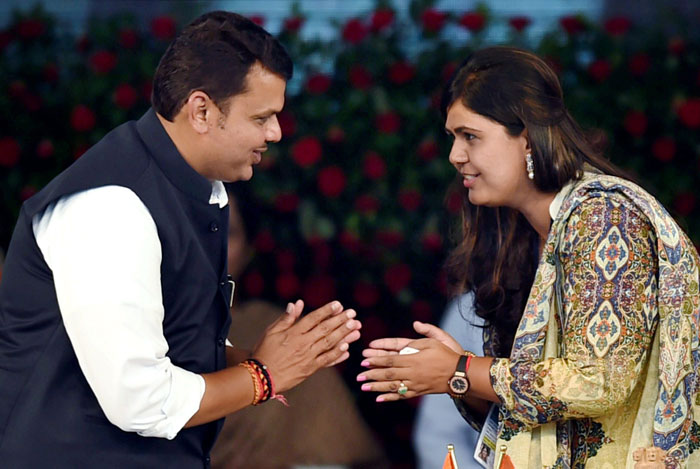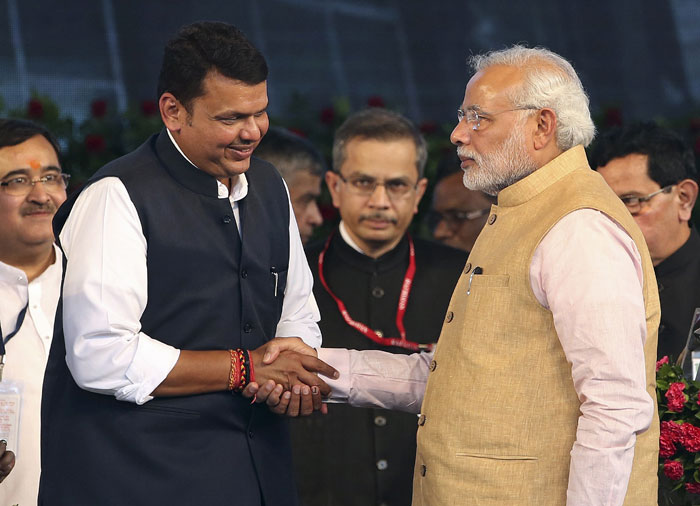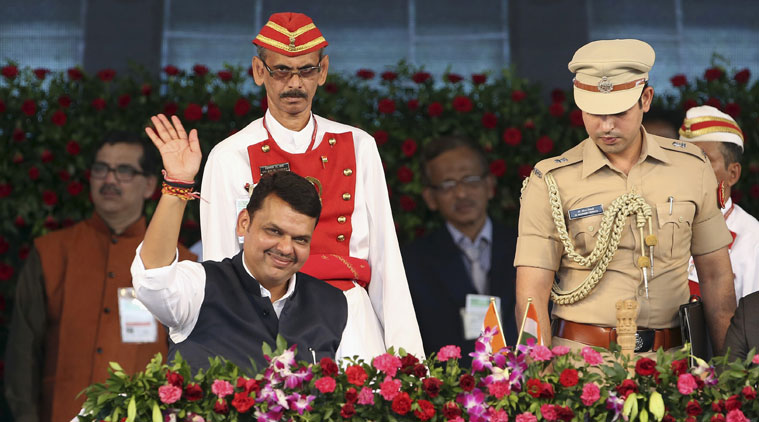There will be better governance, change in work culture: CM Devendra Fadnavis
Devendra Fadnavis, the second youngest CM in Maharashtra and BJP’s first, spoke to Shubhangi Khapre.
 Devendra Fadnavis, the second youngest CM in Maharashtra and BJP’s first, spoke to Shubhangi Khapre. (Source: IE archive)
Devendra Fadnavis, the second youngest CM in Maharashtra and BJP’s first, spoke to Shubhangi Khapre. (Source: IE archive)
Devendra Fadnavis, the second youngest chief minister in Maharashtra and BJP’s first, is known to lead from the front, with a track record of being upright and hardworking. In an interview, Fadnavis says there cannot be any compromise on corruption while promising to take Maharashtra to the pole position in terms of all-round growth.
What will be the top priority My government’s main thrust will be on improving governance. Whether it is central government or state, ultimately they are the service providers addressing the larger policies related to the welfare of the people. I firmly believe the people of Maharashtra deserve better governance. They deserve policies that are well executed within the specific period of time, which means there cannot be any space for corrupt practices in the administration. The perception of a government is very important if we have to take the state ahead. It augers well for the climate of healthy investment in the state. You cannot usher rapid development without effective governance. You will see a change in work culture. Which according to you are critical areas of concern in Maharashtra? High on the agenda would be infrastructure, which includes power, irrigation and roads. Ultimately, if we have to attract major investments in the state, it is mandatory to have good infrastructure. We would require good roads, ports and airports. Secondly, we have to make concerted attempts to improve productivity in the agriculture sector. Since state agriculture productivity is low, the minimum support price allocated from central funds works out low, thus affecting our farmers. Forty five per cent of the state population depends on agriculture. Apart from benefits to the farmers, the failure of the state to achieve its target of 4 per cent agriculture growth has impacted overall state GDP. You always favoured statehood for Vidarbha. Now that you are the CM, what are your views? In principle, the BJP has adopted the theory of smaller states with a single objective of effective governance. Please try to understand that the decision will have to be taken by the Centre. I would also like to point out that when BJP talks of smaller states it ensures the creation of new state with people’s participation. It ensures a smooth process. Take the examples of the creation of Chhattisgarh, Jharkhand and Uttarakhand. The Atal Bihari Vajpayee government completed the process without any violence or inculcating hatred among the people within the two states, whereas the Congress engineers a division in a state, dividing the people and generating hatred. Now, take the case of Andhra Pradesh. The Congress divided Andhra Pradesh to create Telangana and left the people divided because it was politically driven. What according to you went wrong in the 15 years of Congress-NCP governance in Maharashtra? Maharashtra has always centred its governance through institutions. In the last 15-year regime of Congress and NCP, institutions that were the centres for public services and welfare have been weakened and essentially mismanaged. There are several factors essentially mismanaged. My government’s priority would be to strengthen these institutions across sectors. Whether it is financial institutions, agriculture or the education sector, institutions that are the foundation for the state’s socio-economic growth have to be robust so that irrespective of individuals, political party or a change of government there will be continuity in their functioning. You cannot evolve a policy keeping in mind individuals or a select group. How do you then intend to change the face of Maharashtra? I think one has to be guided by a common rule — set your goals, be focussed and achieve them in a time-bound manner. How much of the onus on governance is on the bureaucracy? Do you plan to carry out changes in the bureaucratic setup? I think a lot depends on the political leadership. Ultimately, any executive decision is to a great degree influenced by the political leadership. Or else, how does one explain the fact that bureaucrats who perform excellently in some regions are dismissed as failure in other regions. As the opposition leader, you had taken the lead in exposing scams in the irrigation sector. What are the reforms your government plans in the irrigation sector? Are you indicating a shift from the culture of building big dams to small and medium size dams? It is not a question of big or small dams. There should be a balance and projects, which are worked based on ground reality to serve the region and its people and not driven by a political agenda. Gujarat, another BJP-ruled state, has been competing hard on the industrial front with Maharashtra. What’s going to be your approach? The Centre is to introduce an integrated industrial policy, which would also apply to the state. Efforts would be made to promote small scale sectors. We will also emphasise on manufacturing and service sectors. Much was promised in the past on a Mumbai Makeover. What will be your approach? I think it is high time we seriously considered elevated corridors, which would connect East-West-North-South. In Tokyo, there are eight-level elevated corridors. There is a need for an integrated transport system. To promote rental housing, we will require 30 lakh houses in the coming years. The water transport project between Borivali and Nariman Point has been languishing for the last 15 years. We need to set up at least 10 more complexes on the lines of the Bandra Kurla Complex to address commercial rentals complete with infrastructure. What we need now is quick action and cannot waste time on manufacturing vision documents that are gathering dust. A long pending issue related to Mumbai is massive land locked in centre-state disputes? How will your government address that? Prime Minister Narendra Modi has made it clear that the matter of land disputes should be resolved through greater coordinated effort between the state and the centre and to ensure that it does not get entangled in long court battles. The centre is clear that land disputes should not be dragged to courtrooms. Whether it is land related to defence, port trust, salt pan or railways, the centre is keen to best utilise it and give momentum to big projects including infrastructure and housing, which have been on hold for several decades. What’s your agenda for the social sector? We have a comprehensive Scheduled Caste and Scheduled Tribe plan. What’s required is effective implementation. Take the examples of ashramshalas (tribal schools), which are in a pathetic state because of rampant corruption. What is going to be your government’s policy on minorities? We will have a policy of justice for all and appeasement of none. Unlike others, we will not misuse the minorities as a mere votebank. Our effort would be to bring them into the mainstream through education and better employment. What is your message to the people of Maharashtra? I am committed to the service of the people of Maharashtra. We will bring about a transparent and accountable administration. What are your plans for the education sector and for women empowerment? The human resources development will play a very significant role in my government. It is not just empowerment of women. We would like to convert the better half of the population in the state into human resources that will be crucial and contribute to the overall development of Maharashtra. For any state, the development index is driven by human resources. 
There is a need to review the irrigation policy. The Acts that are defunct need to be replaced with new bylaws. In the end, what matters is simplifying procedures and improving the framework of functions. There is a need to determine projects based on requirement and not driven by political compulsions. The tender process should be to facilitate quick results so that water reaches end user farmers. It is pointless to have half-built irrigation projects when not a drop of water can be drawn from them for the fields. Devendra Fadnavis takes oath as Maharashtra Chief Minister
Devendra Fadnavis takes oath as Maharashtra Chief Minister
































